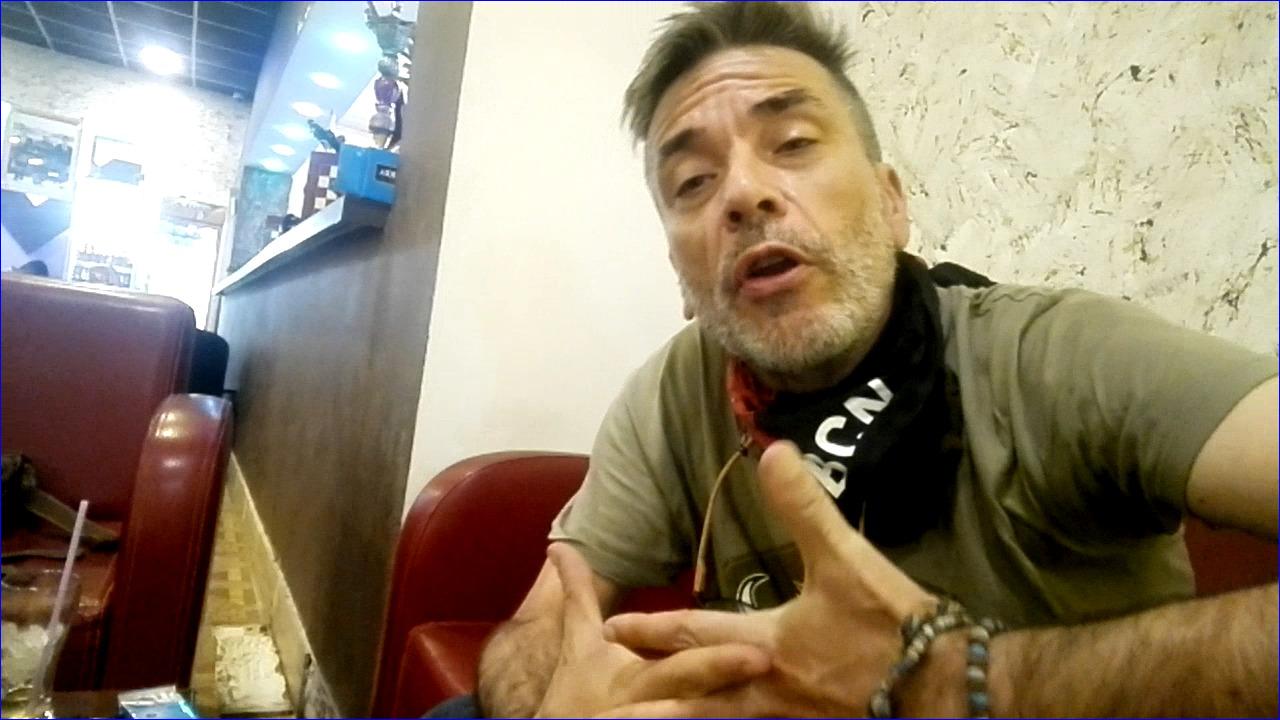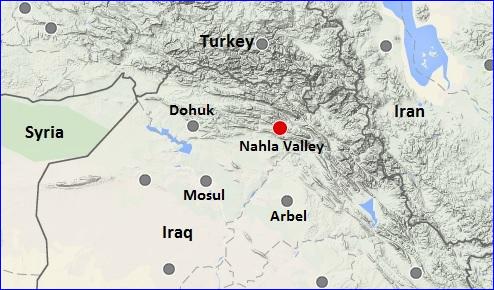


 AINA)
AINA)
Barber is a Spanish national and was working on assignment for German channel ProSieben when he was 'kidnapped' in the Nahla Valley in Duhok governorate on August 8.
Barber told CPJ that he was en route to interview a jihadist in northeastern Syria when he was arrested by three officers who identified themselves as border police. He was initially taken to an Asayish station in Akre before being moved the following day to another facility near Erbil, where he was held for almost a month without charge and unable to contact his family or a lawyer.
In an interview with AINA, Barber said:
The situation of the prisoners and the uncertainty generated by their absolute lack of rights are disturbing. Beatings are common. Overcrowding in cells is a form of torture. The food is disgusting because, among other things, those responsible for the prison are making a profit from the money that the Iraqi Government gives to the prisoners. I have seen people urinating blood without receiving medical attention, or brutally beaten when they asked for help in the infirmary. The living conditions in those cells are incompatible with life. Most inmates ignore the reasons why they were arrested or for how long they must remain in jail. Some have spent years in a hole of one cubic meter for allegedly offending a member of Barzani's family or because they they refused to give more than half of their benefits to any member of the Barzani tribe who tried to extort them. Nobody is entitled to a lawyer or even to the presumption of innocence. That jail is a spider's web where several hundred inmates barely survive in a terrifying legal limbo. Next to me, a Mosul doctor was arrested who was accused of being a member of the ISIS. His only crime was to have a name similar to that of a jihadist murderer. Before being released, the doctor confessed to me that he wanted death. During my stay in the Asayish torture center, a Nepali guy was also arrested and tortured. The Nepali was imprisoned on a preventive basis because the police considered that he could come from one of those Muslim countries where many jihadists are recruited.
In a message to NRT Digital Media, Barber described his experience while in Asayish custody:
Up to 160 people were living in a fifty square meter cell. We are not writing on a blank page. Local and international rights watchdogs like Human Rights Watch and Amnesty International have criticized conditions in the Kurdistan Region's jails in the past. The world must know what is happening in the prisons run by Ismat Argoushi and Masoud Barzani. All those torture centers must be closed. All persons arrested without charges must be released as long as their guilt is not proven. Even criminals have the right to a fair trial.On the other side, one of the most recent qualitative leaps in the quantity and quality of savagery produced by the Kurdish Regional Government (KRG) has to do with the systematic persecution of journalists, especially those whom they link with the democratic opposition or, more generally, with any reporter who does not surrender to the guidelines issued by the Kurdistan Democratic Party (KDP). As I see it, the KDP is not a political party, but a criminal organization ruled by a bunch of mobsters. After our release, our main objective is to identify those responsible for this penitentiary system and the entire repression network. We want to make known the role of Argoushi or Barzani himself. They are ruthless people, true sociopaths. The inmates implored me a thousand times not to forget them after my release. They begged me to make known what happens in those cells. And that's what I'll do.
Press freedom is a significant issue in the Kurdistan Region. On July 15, the Kurdistan Journalists Syndicate said that it recorded 27 serious incidents involving violations against a total of 63 journalists in the Kurdistan Region during the first six months of 2019.
Iraq, including the Kurdistan Region, ranks 156 out of 180 countries in Reporters Without Borders' 2019 World Press Freedom Index.

Speaking to NRT Digital Media, Barber said "It's been an awful experience. Now I am planning to use the data I have collected during my stay in jail to denounce the brutal conditions of confinement suffered by thousands of Kurds and to unmask the true face of one of the worst dictatorships and police on the planet."
Barber said he was arrested and confined in one of the Asayish torture centers despite being invited to visit Nahla by two Assyrian political parties, Abnaa Al Nahrain and Assyrian Democratic Movement.
Related: Kurdish Forces Blockade Assyrian Villages in Iraq
Related: PKK Members Continue to Occupy Assyrian Villages in North Iraq
Related: Kurdish Court Rules Against Assyrian Man in Squatting Case
Related: KDP Intimidation, Expropriation of Assyrian Villages Continues
Concerning these facts, Ferran Barber told AINA he wants to know the Assyrian leaders' views about the new unofficial regulations regarding the visits of foreigners to the Valley of Nahla. "According to the KRG, any foreigner who visits Nahla without a permit will be put in jail. After my release, they told me that I illegally crossed a border because Nahla is a 'de facto' PKK controlled area. The police officer said to me that any other foreign person who visits the valley without KRG authorization will be punished and jailed for months. This statement, made by a member of the Kurdish police, has not been confirmed by official channels but it certainly requires further clarification."
Barber emphasized that this is a very serious matter which threatens the existence of Assyrians in Nahla, and hoped the Assyrian political parties that don't serve the interests of the Barzanis will address the issue.
"The kleptocracy that governs the country feels increasingly cornered," he continued. "It explains the wave of arrests of opponents and journalists. As a result of the loss of their people support, the Barzanis are resorting to violence and the most brutal tactics of repression".
"It is no secret that many Assyrian politicians have been threatened with death by the Kurdish authorities," he said. "I guess the reign of terror established by the KDP has gagged even these leaders who previously dared to defy the dictatorship. One thing is clear. The Barzani jails are full of political prisoners. And the detention center where I was imprisoned is just the tip of the iceberg of a prison system made up of several hidden prisons. There are political prisoners who have been rotting in a hole for years because they dared to challenge the tribal oligarchy that has taken over Kurdistan."
On September 5, Kurdistan Parliament member Soran Omar said that he was ready to reveal the locations of secret jails in the Kurdistan region in response to claims by Dindar Zebari that there are no political prisoners in the region. "Dozens of people have been detained in the prisons and their fates have remained unclear," Omar said, describing the prisoners as "abductees."

or register to post a comment.